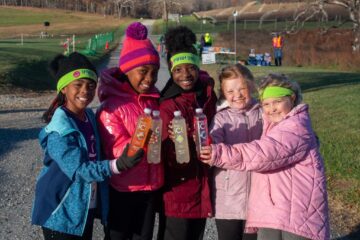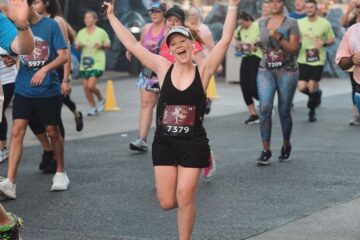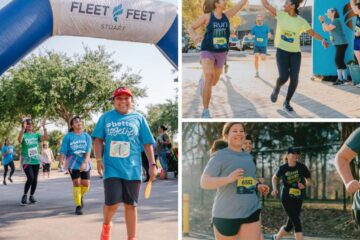Girls on the Run Celebrates 25 Years of Youth Development
By Kate Schwartz
On March 25, 2021, Girls on the Run celebrated our birthday—25 years of youth development—with a dynamic livestreamed event.
Girls on the Run began in Charlotte, NC, in 1996. That first year, 13 girls went through the program. Since then, we have expanded to more than 180 councils nationally and serve over 200,000 girls during a typical year.
The 25th birthday event celebrated the program in true GOTR fashion, which means that motivation and inspiration were top of mind. It featured broadcast journalist and author Hoda Kotb along with a panel discussion from a lineup of experts and athletes on building confidence in girls through sport. CEO Elizabeth Kunz also shared stories about the program’s impact over the years.
What is the GOTR Program Impact?
Dr. Maureen Weiss, one of the event’s panelist speakers, is a professor in the School of Kinesiology at the University of Minnesota, and has studied positive youth development programs in sport for over 37 years.
Weiss recently led a longitudinal study examining the impact of GOTR on positive youth development through surveys and focus groups with girls, coaches and parents.
Weiss’s study found that GOTR’s life skills-focused curriculum taught by trained coaches, positively impacts girls’ lives by helping them to increase their confidence, develop life skills and build healthy relationships. After a three-month follow-up their scores remained stable, suggesting that these lessons were sustained over time.
The study compared GOTR participants to other girls in PE or organized sports who had never participated in GOTR. The GOTR participants scored higher than the comparison groups in areas related to life skill development.
Significant improvements in confidence, self-esteem and connection to peers emerged, with findings particularly strong for girls who started the season with lower scores.
The girls in need of a developmentally-focused program were the ones who benefitted the most. Girls also credited GOTR for helping them learn life skills, including to manage their emotions and resolve conflict.
Ciara Lucas, a television news reporter, volunteer GOTR coach and fitness and nutrition coach based in Columbus, Ohio (and also the panel moderator for the event), praises the GOTR program.
She says the program comes at a crucial time for girls in this stage of development.
“We want to make that impact at a really young age so that we can teach them to be confident before someone tells them otherwise,” she says.
“As we know, women face a lot of different pressures in the world than men, whether that’s beauty standards, the expectations set for women or what’s right or wrong. In GOTR, we have conversations with them about important topics, whether it’s what to do when you’re upset, how to communicate your feelings or how to diffuse conflict. It’s about a lot more than just running which I think is really cool.”
How does GOTR accomplish these outcomes?
Weiss attributes the positive outcomes of the GOTR program to two evidence-based factors: the intentional curriculum of skill building activities and coach training that teaches how to deliver the curriculum as intended. These features are not found in traditional youth sports.
“Many assume that sport automatically develops character and confidence,” says Weiss. “Sometimes traditional youth sports produce negative outcomes. Coaches punish mistakes, or they place the focus on winning over having fun, meeting friends or developing skills that will enable youth to be physically active for a lifetime.”
Weiss says that negative coaching can have a lasting detrimental effect on children. Not only does their self esteem suffer, but their enjoyment declines. This leads to burnout and withdrawal from the activity.
“What we’re trying to do in youth development through sport is to maximize the positive outcomes that can occur,” she says. “If you train coaches on how to coach children in a positive, youth-friendly way, they will be more likely to glean the benefits of the program and continue to be physically active for a lifetime.”
Youth development can occur in any activity that children find joy in doing. The greater they enjoy doing an activity, the more likely they are to continue. Lucas says that even if every girl doesn’t fall in love with running, the goal of completing a 5K often provides a major confidence boost for participants by the program’s end.
“It’s a goal that seems nearly impossible to some of the girls at first. But by the end, they’re the same ones who are crossing the finish line with a smile on their face. And they did it like it was nothing, but they worked so hard to get there.”
How does GOTR inspire you?
It’s not uncommon for the program to inspire coaches, volunteers and parents, who watch the girls as they challenge themselves. Lucas says, “Seeing them finish their 5K race, it made me reflect, how am I pushing myself as an adult? So, I decided to train for my first half marathon.”
One half marathon led to several more for Lucas, and then she progressed to even longer distances. “Hands down, the girls that I coached are the reason I became a marathoner,” Lucas says. “It was like we were pursuing a goal together. We ran different mileage, but it was the same type of goal to be a better version of ourselves together.”
Find the original article by Fleet Feet by clicking here.



